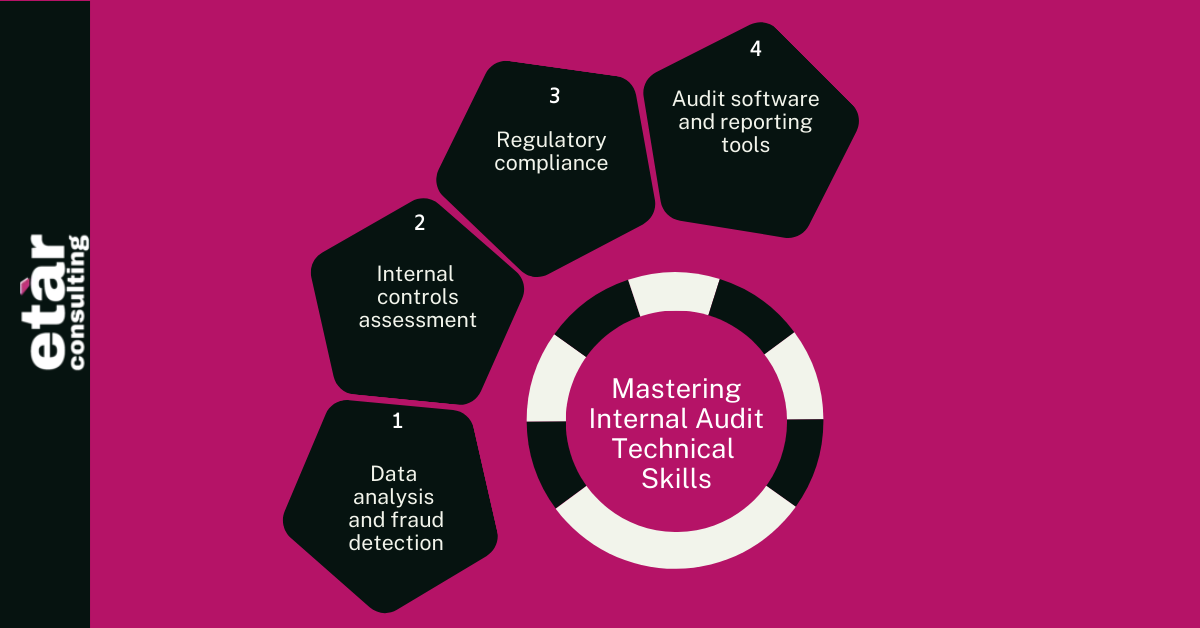
Introduction
Internal auditors play a crucial role in assessing risks, ensuring compliance, and improving business operations. To be successful, they need a mix of technical expertise, analytical skills, and effective communication.
At ETAR Consulting, we specialize in providing internal audit training and consulting services to help professionals enhance their skills. Whether it’s risk-based auditing, compliance, or financial reporting, our expertise ensures organizations achieve their objectives efficiently.
In this blog, we’ll explore essential skills for internal auditors and best practices to enhance efficiency in the auditing process.
Key Skills Every Internal Auditor Must Have
1. Analytical and Critical Thinking
Auditors must be able to interpret financial data, operational reports, and business processes to detect errors and fraud. A strong analytical mindset helps in identifying risks and making informed decisions.
2. Strong Internal Audit Communication Skills
Effective auditors must possess excellent verbal and written communication abilities. They need to present findings, justify recommendations, and interact with stakeholders at all levels. Mastering internal audit communication skills ensures clarity in audit reports and fosters cooperation across departments.
3. Competencies of Internal Auditor
The competencies of an internal auditor go beyond just technical knowledge. They must be proficient in problem-solving, ethical judgment, and leadership. A competent auditor understands business dynamics, adapts to changes, and provides valuable insights for process improvement.
Technical Expertise Required for Internal Auditors
In addition to soft skills, auditors must develop strong technical knowledge in various domains:
1. Mastering Internal Audit Technical Skills

To conduct thorough audits, auditors need to be proficient in:
- Data analysis and fraud detection
- Internal controls assessment
- Regulatory compliance
- Audit software and reporting tools
Enhancing internal audit technical skills ensures accurate evaluations and effective risk management.
2. Understanding Financial Statements and Compliance
Auditors must be skilled in analyzing financial statements, balance sheets, and cash flow reports. Understanding regulatory frameworks such as IFRS, GAAP, and SOX ensures businesses adhere to industry standards.
3. Implementing Technology in Internal Auditing
The future of auditing is data-driven. Leveraging audit automation tools, AI-driven analytics, and cloud-based auditing platforms improves efficiency and reduces errors.
Best Practices for Improving Internal Audit Efficiency
1. Develop a Risk-Based Audit Plan
A structured risk-based internal audit plan helps organizations prioritize high-risk areas, allocate resources effectively, and streamline audit processes.
2. Improve Time Management in Auditing
- Set clear audit objectives and timelines.
- Focus on high-risk areas rather than low-impact activities.
- Use checklists and frameworks to maintain consistency.
3. Stay Updated with Industry Changes
- Regularly attend training programs and workshops.
- Follow global audit standards and emerging risks.
- Engage in continuous professional development.
Overcoming Common Challenges in Internal Auditing
1. Handling Resistance from Departments
Auditors often face pushback from employees and management. The solution is to educate teams on the benefits of internal auditing and work collaboratively to implement improvements.
2. Ensuring Independence and Objectivity
An effective audit requires unbiased reporting and independence from management. Following ethical guidelines and transparent auditing practices maintains credibility.
3. Managing Complex Audit Findings
To handle complex issues:
- Present audit findings in a clear, actionable manner.
- Offer practical recommendations rather than just identifying problems.
- Work closely with management to implement solutions.
How ETAR Consulting Can Help Improve Internal Audit Skills
At ETAR Consulting, we provide specialized training and consulting services to help internal auditors enhance their efficiency and technical expertise.
1. Tailored Internal Audit Training Programs
We offer customized training sessions covering audit best practices, risk management, and compliance strategies.
2. Expert Guidance on Risk-Based Auditing
Our consultants develop risk-based internal audit plans to help businesses focus on critical areas.
3. Advanced Audit Consulting Services
We assist organizations in audit documentation, process improvement, and compliance assessments to ensure operational success.
Explore more Internal Audit Tips for Business Growth
| Internal Audit | Tips |
| – Importance of internal audit training – Best practices for training auditors – How to develop audit skills effectively | |
| – Understanding risk-based audit approach – Developing a risk-based audit plan – Improving risk management strategies | |
| – Essential technical and communication skills – Competencies of an effective auditor – How to improve audit efficiency | |
| – Enhancing business operations through audits – Key steps for a successful operational audit – Improving internal control efficiency | |
| – Importance of risk assessment in internal controls – Key risk assessment procedures – How to strengthen risk management frameworks |
Conclusion

Enhancing internal auditor skills is crucial for conducting effective internal audits and improving business performance. By mastering risk assessment, technical knowledge, and communication, auditors can significantly enhance their efficiency and impact.
At ETAR Consulting, we offer expert internal audit training and consulting to help auditors refine their skills. Whether you need support in risk-based auditing, compliance, or automation, we have the expertise to help you succeed.
For more details, visit ETAR Consulting and advance your internal audit career today!
FAQs
1. What are the key competencies of an internal auditor?
An internal auditor should possess strong analytical skills, risk assessment abilities, communication skills, and ethical judgment. They should also be proficient in internal audit technical skills to conduct effective audits.
2. How can I improve my internal audit communication skills?
To enhance internal audit communication skills, focus on clear and concise reporting, active listening, and structured presentations. Regular practice and feedback from colleagues also help in improving communication effectiveness.
3. What is a risk-based internal audit plan?
A risk-based internal audit plan prioritizes high-risk areas within an organization. It helps optimize resources, improve compliance, and strengthen internal controls by focusing on critical risks rather than low-impact areas.
4. Why is internal audit training important?
Internal audit training is essential to stay updated on industry standards, regulatory changes, and best practices. Continuous learning helps auditors refine their skills and enhance their contribution to business success.
5. How does ETAR Consulting help internal auditors?
ETAR Consulting provides expert training, risk-based audit consulting, and compliance guidance to help internal auditors develop their skills and improve audit efficiency. Their tailored programs ensure professionals stay ahead in the field.

